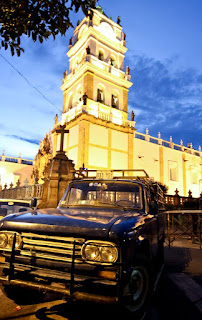After the trauma of the mine, we decided to get the hell out of Potosí and make our way to the lovely colonial town, Sucre. It was here that Simon Bolivar signed the country´s independence from Spain, giving birth to the republic of Bolivia and turning him into a national hero.
Walking through the beautiful cobbled streets it's easy to understand why this town is a UNESCO World Heritage Site with it's perfectly preserved colonial architecture. However, contrasting sharply with the rest of what we have seen of Bolivia, this place was congested with fancy new jeeps and shiny pick up trucks. Clearly no shortage of money in this town! Keeping with the opulent feel of Sucre we opted for a hostal a tiny bit over budget and we enjoyed every single minute of it, so much so, that we stayed three nights. Something we may regret later.
Despite it's proud display of wealth, the women below, in true Bolivian style make their presence known.
The wonderful juice man and his amazing machine. Thirty cents and you have a large glass of pure orange juice in a few seconds. Bruno reckons when we get back, he will make one for me to stand in Cascais to pay off the trip, actually, not such a bad idea.
Sucre was full of bohemian bars and restaurants. The one below even had a living room style cinema, full of comfy sofas with a bar showing international films. We missed The Devil's miner, a film about the Potosí mine, where we had just come from. Instead, we watched 'Cidade de Deus' (City of God) a powerful and shocking Brazilian film that I recommend everyone to watch.
















No comments:
Post a Comment